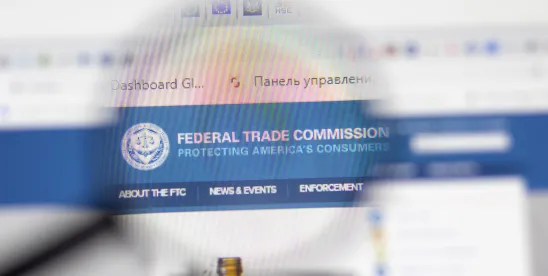The FTC’s Warning Letters
Earlier this month, the Federal Trade Commission (FTC) sent eight companies warning letters regarding their warranty practices, alerting them that certain restrictive warranty language may violate federal law by limiting consumers’ rights to repair the products they purchased.
In its corresponding press release, the FTC explained that five of the companies’ warranties require consumers to use specified parts or service providers in order to keep their warranties intact when making a repair. This practice, the FTC explains, is generally prohibited by the Magnuson-Moss Warranty Act (MMWA), subject to limited exceptions (discussed below). These types of statements could also be considered deceptive under the Federal Trade Commission Act. The three other companies at issue use strategically placed stickers on their products that read “warranty void if removed” (or similar language). The sticker’s location on the product prevents the consumer from making routine repairs, which, according to the FTC, also violates the law.
The letters explain that the companies have 30 days to review and revise their promotional and warranty materials to eliminate prohibited statements. After that time, FTC staff will review the companies’ websites to ensure there are no statements claiming — or implying — that “warranty coverage is conditioned on the use of specific parts or services.” The press release states that “[f]ailure to correct any potential violations could result in law enforcement action.”
The Magnuson-Moss Warranty Act
Passed in 1975, the MMWA is the federal law that governs consumer product warranties. It improved consumers’ access to warranty information by requiring consumer products manufacturers to provide transparency about warranty coverage. The purpose of the MMWA is consumer protection, with the idea of encouraging warranty competition.
With some exceptions, Section 102(c) of the MMWA prohibits companies from using “Tie-In Sales” provisions. Generally speaking, manufacturers cannot state or imply that a consumer must buy or use an item or service from a particular company to keep their warranty coverage. The FTC provides the following examples of prohibited language:
“To keep your new Plenum Brand Vacuum Cleaner warranty in effect, you must use genuine Plenum Brand Filter Bags. Failure to have scheduled maintenance performed, at your expense, by the Great American Maintenance Company, Inc., voids this warranty.”
“This limited warranty shall not apply if the warranty seal has been broken, removed, erased, defaced, altered, or is otherwise illegible,” where a device cannot be repaired without such effects.
As an exception to this general rule, a warrantor can require a consumer to use select items or services if they’re provided free of charge under the warranty or the warrantor received a waiver from the FTC. The FTC is likely to grant a waiver if the business can prove, to the FTC’s satisfaction, that the product will not function properly without a specific item or service.
The MMWA also allows a manufacturer to disclaim warranty coverage for defects or damage caused by the use of replacement parts or service the manufacturer did not provide. The FTC provides the following as an example of a permissible warranty provision:
“Necessary maintenance or repairs on your AudioMundo Stereo System can be performed by any company. Damage caused to the AudioMundo Stereo System by you or any non-authorized third party, however, may void this warranty.”
The FTC’s Attention on Right to Repair Is Not New
While the FTC’s concern with repair restrictions, specifically the anti-tie-in provision, dates back more than four decades, the FTC recently raised the profile of this issue when it published a May 2021 Report to Congress, “Nixing the Fix: An FTC Report to Congress on Repair Restrictions.” In requesting the report, Congress noted that it was “aware of the FTC’s ongoing review of how manufacturers — in particular mobile phone and car manufacturers — may limit repairs by consumers and repair shops, and how those limitations may increase costs, limit choice, and impact consumers’ rights under the Magnuson-Moss Warranty Act.” With this in mind, Congress directed the FTC to include in its Report recommendations on how to best address these problems. In July 2021, the FTC followed up its Report by unanimously adopting a policy statement aimed at restoring the right to repair and increasing law enforcement against repair restrictions.
In June and July 2022, the FTC announced cases against Harley-Davidson Motor Company Group, MWE Investments, and Weber-Stephen Products, alleging that their product warranties included statements that violated the MMWA. The October 2022 final orders in these cases required the companies to take significant corrective action, including requirements to add specific language to their warranties recognizing consumers’ right to repair and posting notices informing customers that their warranties would remain in effect even if they buy aftermarket parts and/or patronize independent repairers.
Actions Manufacturers Can Take
The July warning letters build upon and further support the FTC’s position that it is illegal under federal law for companies to limit consumers’ repair choices through restrictive warranty language. Consumer products manufacturers providing warranties should review their warranty language to ensure it does not run afoul of the MMWA and the FTC’s concerns.





 />i
/>i

